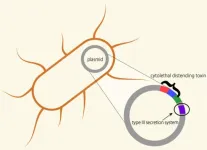(Press-News.org) Abdominal pain, diarrhea, and debilitating fatigue define the daily lives of millions of people worldwide who suffer from chronic bowel disease. Most of these individuals are diagnosed in their youth, and the disease’s progression can vary significantly, leaving patients uncertain about what the future holds. For some, ulcerative colitis is a manageable condition, while for others, it leads to frequent hospitalizations, complex medication regimens, and multiple surgeries.
Now, researchers from the Center for Molecular Prediction of Inflammatory Bowel Disease (PREDICT) at Aalborg University, have identified a genetic variant that may help predict which patients are likely to develop severe ulcerative colitis. Their study, just published in the Journal of the American Medican Association, JAMA, could guide more targeted treatment strategies.
"We have long known about this gene and its connection to colitis. However, we have now demonstrated that the same gene can predict whether a patient will require more intensive treatment, including higher medication doses or major surgery. This knowledge is critical as we aim to tailor treatments more effectively," says PhD student and lead author, Marie Vibeke Vestergaard.
More Aggressive Treatment from the Outset
The study, which analyzed both genetic data and Danish health records, found that around three percent of patients with ulcerative colitis carry a specific genetic variant – HLA-DRB1*01:03. Among this group, over 40 percent underwent major gastrointestinal surgery within the first three years of diagnosis—compared to only nine percent of those without the variant.
“This is a group of patients who are especially hard-hit by the disease,” says Vestergaard.
“In cases of ulcerative colitis, early intervention is essential to prevent the disease from progressing and damaging the intestines. Our hope is that this discovery will allow doctors to closely monitor these patients from the very start, potentially administering more aggressive treatment early on.”
Vestergaard explains that preventing disease progression could not only improve patient outcomes but also reduce societal healthcare costs.
“By targeting treatment more precisely from the beginning, we can avoid the inefficiencies of trial-and-error approaches,” she adds.
A Significant Genetic Effect
Head of Genomics at PREDICT, Associate Professor Aleksejs Sazonovs, was surprised by the strength of the findings, noting the substantial impact of a single genetic variant.
"I'm extremely proud of the work we’ve done at PREDICT, demonstrating how Denmark’s unique health data and biobank resources can benefit patients worldwide. As rates of inflammatory bowel diseases continue to rise in Western countries, the more we understand about the underlying genetics, the better we can treat and prevent these conditions."
Sazonovs emphasized that while the results are promising, they must be validated through external studies. The next step will involve clinical trials to assess the impact of intensified monitoring and early treatment in patients with the genetic variant.
FURTHER INFORMATION
Ulcerative Colitis Overview
Ulcerative colitis is a chronic inflammatory bowel disease, commonly affecting young individuals. In the US alone, around 750,000 people are affected by the disease. The severity and progression of the disease vary greatly from person to person. While some experience only mild symptoms, others endure more severe cases, involving frequent hospitalizations, changes in medications, and, in some instances, surgery to remove affected parts of the intestine.
In some patients, symptom-free periods may last for an extended time, but relapses are common. The unpredictable nature of the disease means it's often unclear whether a particular treatment is effective.
Research Findings
Researchers have identified a specific genetic variant, HLA-DRB1*01:03, which is strongly associated with severe cases of ulcerative colitis. Around 3% of patients with ulcerative colitis carry this variant. Among these individuals, over 40% required major gastrointestinal surgery within the first three years after diagnosis, compared to only 9% of those without the variant.
About PREDICT
Denmark's Basic Research Foundation has allocated DKK 68.5 million to support the Center for Molecular Prediction of Inflammatory Bowel Disease (PREDICT) at Aalborg University (AAU).
END
Researchers Identify Gene Linked to Severe Ulcerative Colitis
Danish researchers have made a breakthrough in understanding why some patients with ulcerative colitis endure a more severe disease course than others. Their findings mark a significant step toward personalized medicine.
2024-10-17
ELSE PRESS RELEASES FROM THIS DATE:
New report shows pathway to telecommunications resilience in Australia
2024-10-17
Australia is taking proactive steps to enhance the resilience of its telecommunications sector, according to a world-first report from The Australian National University (ANU).
Several recent high-profile outages, contrasted with the near seamless shift to remote work during the pandemic, have shown how telecommunications resilience significantly impacts all Australians with stakes that are higher than ever before.
Telecommunications underpins our lives from global commerce and emergency services to healthcare and national security and energy and transportation.
Despite its ...
Initial prescriptions of sedatives among older stroke survivors may include too many pills
2024-10-17
Research Highlights:
Within 90 days after having an ischemic (clot-caused) stroke, about 5% of stroke survivors ages 65 and older were prescribed benzodiazepines (depressants that relieve anxiety, muscle spasms, produce sedation and reduce seizures) for the first time.
More than half of the new prescriptions of benzodiazepines were written for a supply of 15 to 30 days, rather than the smaller number of pills for short-term, as-needed use.
The study also found that women were more likely than men to receive an initial prescription ...
Buy your groceries online? Watch out for this food labeling gap
2024-10-17
Picture this: You’re shopping online for this week’s groceries. You try to pick healthy options based on the information provided by the online retailer. You can tell that the products you’re choosing are organic, non-GMO, or Fair Trade Certified. But in many cases, you can’t find the nutrition facts, ingredient list, or even a list of allergens.
A new, comprehensive study of online grocery retailers shows this problem is pervasive, to the detriment of public health and safety in the ...
Etcembly and University of Surrey launch pioneering study to unlock next-generation cancer treatments from survivors
2024-10-17
British techbio innovator Etcembly is teaming up with researchers and clinicians from the University of Surrey to launch a groundbreaking new study that could transform the future of cancer treatment. By analysing the immune cells of cancer survivors, this research is set to reveal untapped targets that could deliver the next generation of immunotherapies.
In recent years, treatments that harness a patient’s own immune system to fight cancer have become a key pillar of oncology. However, these drugs don’t work for all, and a wider range of novel immunotherapies is urgently needed.
T ...
City microbes surviving on disinfectants, research reveals
2024-10-17
After the recent pandemic, our use of disinfectants has increased, but are our efforts to create sterile urban environments backfiring?
A new study published in the journal Microbiome has identified novel strains of microbes that have adapted to use the limited resources available in cities and shown that our everyday behaviour is changing the makeup of microorganisms in indoor environments.
“Built environments offer distinct conditions that set them apart from natural and engineered habitats,” says Dr Xinzhao Tong, an assistant professor at Xi’an Jiaotong-Liverpool University (XJTLU), China, and lead author ...
Sleeping for 2: CBT for insomnia combats postpartum depression
2024-10-17
Cognitive behavioural therapy for insomnia (CBTI) delivered during pregnancy significantly reduces postpartum depressive symptoms in mothers, new research from UBC shows.
Researchers from the Vancouver and Okanagan campuses investigated whether treating insomnia during pregnancy could alleviate symptoms of postpartum depression, which affects many new mothers.
“Early intervention is crucial for infant and maternal mental health,” says Dr. Elizabeth Keys, an Assistant Professor in UBCO’s School of Nursing and study co-author. “Our research explores how addressing sleep problems, like insomnia, can lead to ...
Financial incentive encourages healthiness: why isn't it used more often?
2024-10-17
Move more, quit smoking, lose weight: great resolutions, hard to keep. But does it get easier if there is a financial incentive in return? According to research by Radboud University and others, it can be an effective tool, although there are still some obstacles. They presented their findings this week in Economisch Statistische Berichten (ESB).
Some lifestyle interventions are more effective than others, but in general, financial incentives are a ‘powerful tool to help reduce health inequalities in the Netherlands’, says Koen van der Swaluw of Radboud University. Despite knowing more and more about the effectiveness of financial incentives to promote ...
People sympathize with bullied AI bots
2024-10-17
In an Imperial College London study, humans displayed sympathy towards and protected AI bots who were excluded from playtime.
The researchers say the study, which used a virtual ball game, highlights humans' tendency to treat AI agents as social beings – an inclination that should be considered when designing AI bots.
The study is published in Human Behavior and Emerging Technologies.
Lead author Jianan Zhou, from Imperial’s Dyson School of Design Engineering, said: “This is a unique insight into how humans interact ...
Providencia rustigianii has virulence gene akin to Salmonella’s
2024-10-17
Salmonella and E. coli are well-known bacteria that cause food poisoning, but less understood are species of Providencia, another causative agent of serious symptoms. Providencia rustigianii, isolated from pediatric gastroenteritis patients, has now undergone whole genome sequencing by a research team led by Osaka Metropolitan University Professor Shinji Yamasaki of the Graduate School of Veterinary Science and the Osaka International Research Center for Infectious Diseases.
Members of the team had previously reported that P. rustigianii carries a cytolethal distending toxin virulence gene on its plasmid. Elimination of this gene did not ...
Ozempic (and similar medications) may be the new treatment for opioid and alcohol use disorder
2024-10-17
A new study published in the scientific journal Addiction has found that people with opioid or alcohol use disorder (OUD, AUD) who take Ozempic or similar medications to treat diabetic/weight-related conditions appear to have a 40% lower rate of opioid overdose and a 50% lower rate of alcohol intoxication than people with OUD and AUD who do not take Ozempic or similar medications.
Ozempic is one of several medications, called glucagon-like peptide-1 receptor agonists or GLP-1 RAs, that are prescribed to treat diabetes, obesity, and other weight-related medical conditions. The medications interact with ...
LAST 30 PRESS RELEASES:
Alkali cation effects in electrochemical carbon dioxide reduction
Test platforms for charging wireless cars now fit on a bench
$3 million NIH grant funds national study of Medicare Advantage’s benefit expansion into social supports
Amplified Sciences achieves CAP accreditation for cutting-edge diagnostic lab
Fred Hutch announces 12 recipients of the annual Harold M. Weintraub Graduate Student Award
Native forest litter helps rebuild soil life in post-mining landscapes
Mountain soils in arid regions may emit more greenhouse gas as climate shifts, new study finds
Pairing biochar with other soil amendments could unlock stronger gains in soil health
Why do we get a skip in our step when we’re happy? Thank dopamine
UC Irvine scientists uncover cellular mechanism behind muscle repair
Platform to map living brain noninvasively takes next big step
Stress-testing the Cascadia Subduction Zone reveals variability that could impact how earthquakes spread
We may be underestimating the true carbon cost of northern wildfires
Blood test predicts which bladder cancer patients may safely skip surgery
Kennesaw State's Vijay Anand honored as National Academy of Inventors Senior Member
Recovery from whaling reveals the role of age in Humpback reproduction
Can the canny tick help prevent disease like MS and cancer?
Newcomer children show lower rates of emergency department use for non‑urgent conditions, study finds
Cognitive and neuropsychiatric function in former American football players
From trash to climate tech: rubber gloves find new life as carbon capturers materials
A step towards needed treatments for hantaviruses in new molecular map
Boys are more motivated, while girls are more compassionate?
Study identifies opposing roles for IL6 and IL6R in long-term mortality
AI accurately spots medical disorder from privacy-conscious hand images
Transient Pauli blocking for broadband ultrafast optical switching
Political polarization can spur CO2 emissions, stymie climate action
Researchers develop new strategy for improving inverted perovskite solar cells
Yes! The role of YAP and CTGF as potential therapeutic targets for preventing severe liver disease
Pancreatic cancer may begin hiding from the immune system earlier than we thought
Robotic wing inspired by nature delivers leap in underwater stability
[Press-News.org] Researchers Identify Gene Linked to Severe Ulcerative ColitisDanish researchers have made a breakthrough in understanding why some patients with ulcerative colitis endure a more severe disease course than others. Their findings mark a significant step toward personalized medicine.


